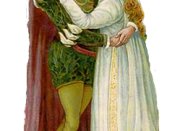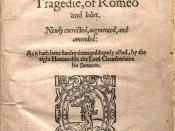"Two households, both alike in dignity,
In fair Verona (where we lay our scene),
From ancient grudge break to new mutiny,
Where civil blood makes civil hands unclean.
From forth the fatal loins of these two foes
A pair of star-crossed lovers take their life;
Whose misadventured piteous overthrows
Doth with their death bury their parents' strife.
The fearful passage of their death-marked love,
And the continuance of their parent's rage,
Which but their children's end nought could remove,
Is now the two hours' traffic of our stage;
The which if you with patient ears attend,
What here shall miss, our toil shall strive to mend."
(p.53 "Romeo and Juliet" Edited by G. Blakemore Evans)
Most readers of the play, "Romeo and Juliet" do not pay attention to this part of the text. In essence, this elegy (which is written in the Italian sonnet form), is a summary of the entire play.
This prologue-chorus serves as what was entitled "The Argument of the Tragedie" (Goboduc 1561), usually prefixed to both misfortunes and pleasantries written under classical or neo-classical persuasion. George Gascoigne, in "Supposes" (1566), depicts it as "The Prologue or Argument." Brooke's "Argument", in Italian sonnet form, probably proposed the verse structure.
The "two households" being spoken about here are those of the Montague and Capulet families. The members of these households are wealthy and hold equal status in the society of Verona. However, even though they can both greatly benefit the society, they refuse to unite and sign a peace treaty. This rebuttal to create peace continuously causes confusion and pandemonium within the streets of Verona. Apparently, their warfare has been going on for years. The situation is so appalling that, even the servants of the households are at war. This feud shall cause both sadness and obliteration to...



Sonnet of romeo and Juliet
This is a very good essay. I would have liked it, goven the title, if a little more time had been spent on form (but then I would - you have seen my essays)
Just one point the sonnet is shakespearean - the couplet at the end gives it away although it does follow surreys form.
4 out of 4 people found this comment useful.